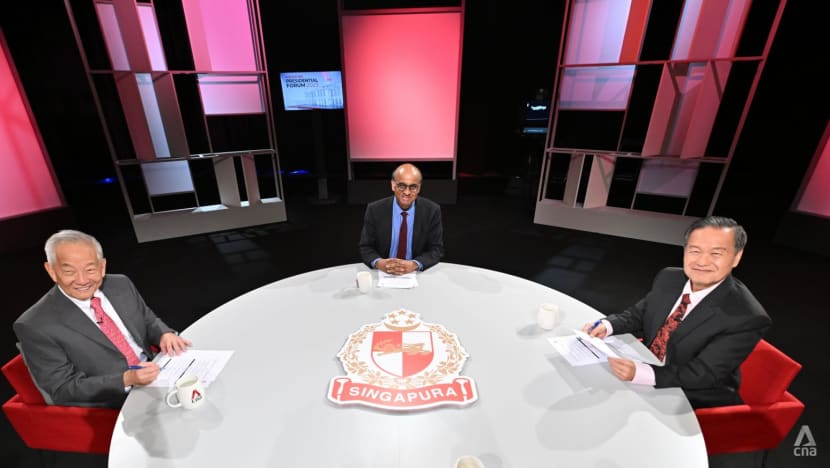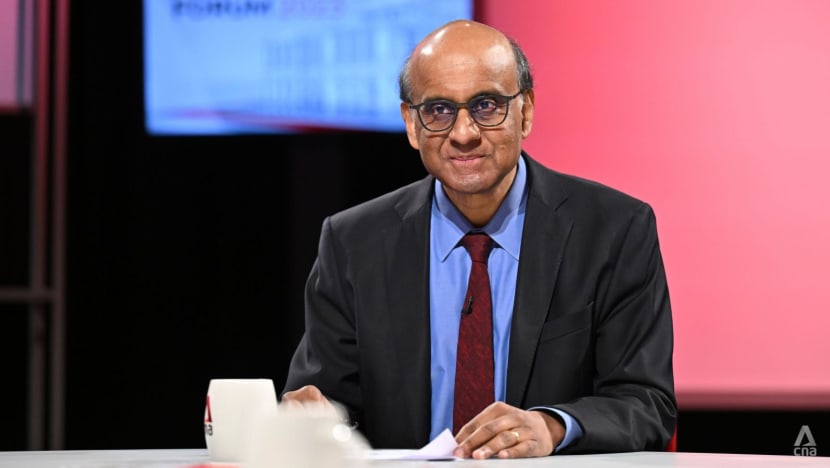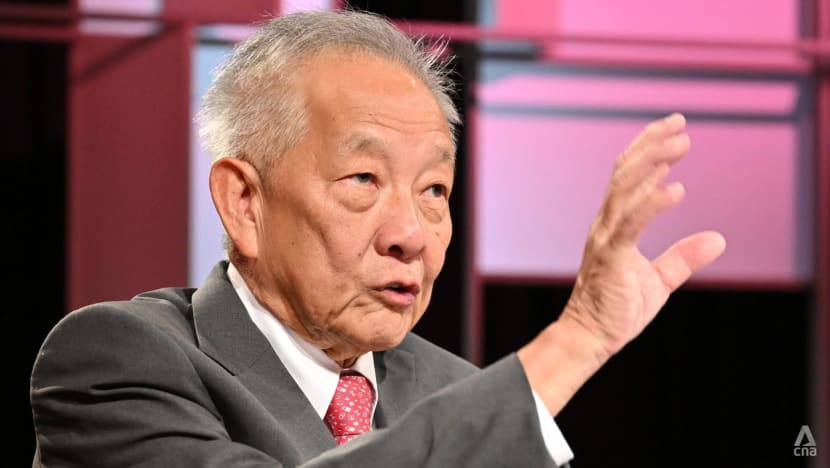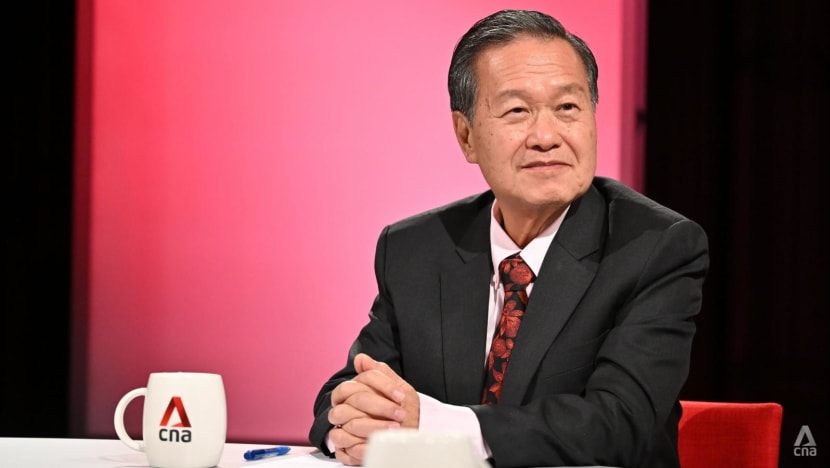Looking at candidates' political ties 'simplistic', rules out even senior civil servants, says Tharman in presidential forum
During CNA's live presidential forum, candidates were asked about their impartiality and how they will convince voters they will exercise their powers without fear or favour.

Singapore presidential candidates Ng Kok Song, Tharman Shanmugaratnam and Tan Kin Lian before the start of the televised forum on CNA on Aug 28, 2023. (Photo: CNA/Jeremy Long)
SINGAPORE: Mr Tharman Shanmugaratnam said on Monday (Aug 28) that labelling candidates by their political affiliations is an "extremely simplistic" thinking that would have ruled out many past presidential candidates from a contest, and even senior civil servants who worked under politicians.
Mr Tharman was speaking during a forum that was broadcast live on CNA.
He and the other two presidential candidates - Mr Ng Kok Song and Mr Tan Kin Lian - were asked about their impartiality, with host and CNA presenter Otelli Edwards noting that each of the three is either linked to the establishment, the ruling party or the opposition.
"How can you convince voters you will exercise your powers without fear or favour, for the good of Singapore?" she asked.
Mr Tharman, who was a former Senior Minister, said that the presidential contest should be about the individuals who are running, their character and their track record.
"If we go with a label of whether you've been a member of a political party or not. I think that's extremely simplistic," he said, adding that this would have ruled out former presidents Ong Teng Cheong and Tony Tan, as well as past presidential candidate Tan Cheng Bock.
It would also rule out people who may not be members of a political party but who are senior civil servants who "owe their positions to bosses who are political figures".
"Are they obligated to their bosses because of that? Not necessarily - it depends on the individual," Mr Tharman said.
"Let's say you have a private company, you have a construction company that depends on government contracts. Or you have a fund management company that depends on government monies. Does that make you not independent? Not necessarily. It depends on your character, your track record," he continued.
"So I would say avoid the simple labels, make this a contest between individuals. Do they have a spine? Do they have the track record?"
The political leanings and past affiliations of each candidate have come under scrutiny over the past few days of campaigning.
Mr Tharman, 66, had resigned from all his positions in government and as a member of the ruling People's Action Party to run for President.

Mr Ng, 75, has repeatedly emphasised that he is the only candidate who has no political affiliations, although he has links with the establishment as a long-time public servant.
He worked at Singapore's sovereign wealth fund GIC for close to three decades, rising through the ranks to become group chief investment officer from 2007 to 2013. He now chairs Avanda Investment Management.

During the televised forum on Friday, Mr Ng said there is "no better safeguard" than having a President who does not have any political affiliations.
"If you have candidates who are supported or endorsed by any political party, there is a danger that the President cannot act without fear or favour because the President might have been influenced in serving the political agenda of the political parties concerned," he added.
"I stand as the only non-partisan candidate in this Presidential Election."

Mr Tan, 75, is supported by a number of opposition figures, including two former rivals in the last contested Presidential Election in 2011 - chairman of the Progress Singapore Party Dr Tan Cheng Bock and Mr Tan Jee Say.
The former NTUC Income chief executive said that the most important consideration was to understand the problems facing the people of Singapore and solve them.
"It is not helpful when you are solving difficult problems to mix up the concept of: 'Is this a solution of party A or party B? I do not believe in politicking because it's taking away time that should be going into understanding the problem and solving the problem," he said in response to the question put forth at the forum.
Mr Tan added that Singapore has many problems that are "unsolved over past decades", such as the low birth rate and "life becoming more difficult".
"These are very important things to solve, and we shouldn't be thinking about politicising," he said.
BECOMING UNIFYING FIGURES
During the hour-long forum, the three candidates were asked a series of nine questions and were each given a set length of time to answer them.
Addressing another question on how they will be a unifying figure for Singapore, Mr Ng said that he wants to encourage more interracial help, as there was too much emphasis in the past on caring for one's own racial or religious community.
"The second thing is to constantly remind Singaporeans that we are a united nation," he said, as he described his election symbol, which is a palm with a heart in the centre.
"When one finger gets wounded, the whole hand, the whole palm feels the pain. So we must develop this empathy, this compassion towards people of other communities," he added.
Mr Tharman emphasised that Singaporeans should "deepen" multiculturism and participate in each others' cultures. He brought up a second point - that Singapore's democracy is becoming more diverse in its views.
He said he intends to advocate strongly for respecting differences in views if elected President.
"I have found over the years ... that there are very few differences which cannot be bridged. We've got to work at it, bridging those differences. Even if you can't agree on everything, respect the differences of perspective and find common ground," he said.
Mr Tan took a different tack, saying that the most important factor to unify people is that they should feel financially secure, so "sorting out" the economic situation is key.
"The key problem now is people find that the cost is too high, housing is too expensive, jobs are insecure. Now, if we can solve this problem, which is my main thrust, then people have more time to think beyond themselves, into the community, into society at large, that they become more unified," he said.
Campaigning for the Presidential Election has entered its final stretch. Singaporeans will go to the polls on Sep 1.

















